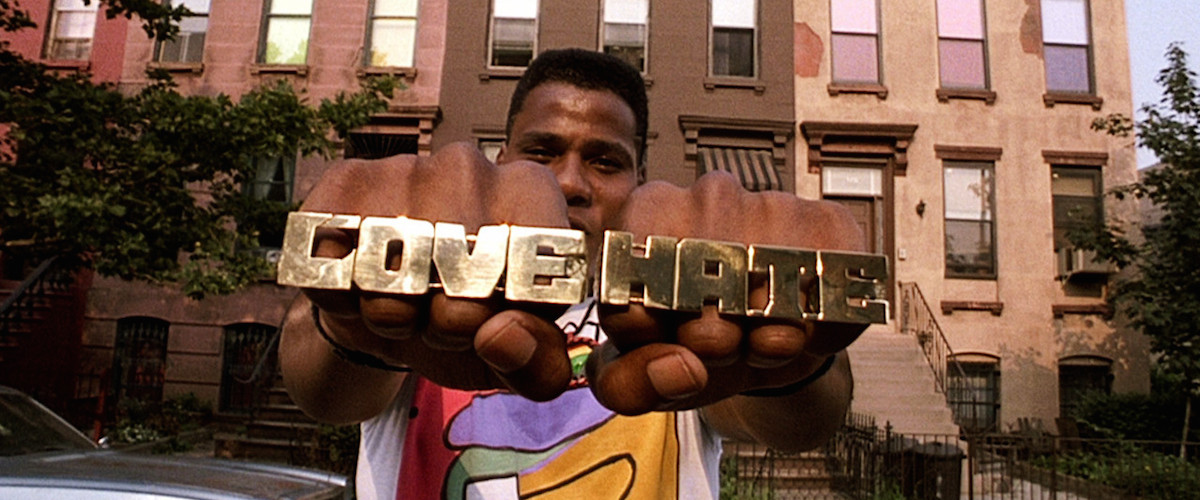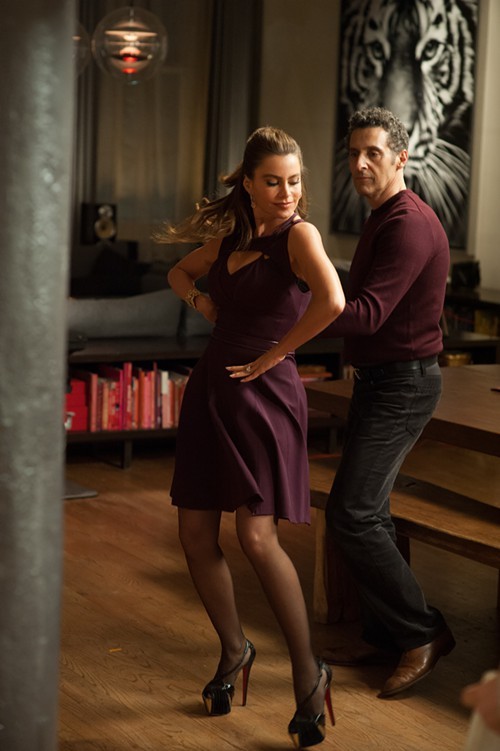For Never Seen It, I watch a classic (or maybe not-so-classic) film with an interesting person who is watching it for the first time. Sam Cicci is an associate editor at Contemporary Media, and covers Memphis 901 FC for the Memphis Flyer. He chose Spike Lee’s 1989 masterpiece Do The Right Thing.
Chris McCoy: Tell me what you know about Do The Right Thing.
Sam Cicci: Well, not a whole lot. It’s one of those things that I’ve just heard referenced a lot. I think my parents liked it when it came out. I know it’s about simmering racial tensions in New York City in what, the late eighties maybe? And it’s centered around a pizza parlor or something. I know it’s kind of like, uh, I think it’s about African-Americans and Italian immigrants, and just kind of how those cultures are clashing in this community.
CM: Have you ever seen any other Spike Lee movies?
SC: I don’t think so. I think I’ve only seen half of Da 5 Bloods.
CM: Well, this is going to be great, then!
SC: Yeah, I’m excited. I feel like there’s a big hole in my pop culture repertoire.
120 minutes later…
CM: Sam Cicci, you are now a person who has seen Do The Right Thing. What did you think?
SC: Well, it was really good. It was phenomenal! And I’m also just filled with this overwhelming sense of sadness after it wrapped up. I guess, uh, watching it, especially in today’s climate…it was made in 1989, is that right?
CM: Yeah, ’89.
SC: I feel like it could have been made today, or 10 years ago. It has sort of a timeless feel to it. That is just really depressing, when you think about it like that.
CM: Yeah, I really felt Ruby Dee at the end. Mother Sister, you know, she just screams “No!” for probably 30 seconds of screen time. It really brought tears to my eyes this time. I feel that overwhelming sense of frustration. I really relate to that right now after like the last, you know, well, I guess five years, but really the last year specifically. When she’s screaming, it just really hit me. The whole thing is so prophetic, like when Radio Raheem is put in a choke hold by a cop and strangled to death. That’s exactly what happened to George Floyd, right?
SC: You hear the police sirens, and that cop car starts rolling up the street, and you know it’s only going to end one way at that point. And there’s just this pit in your stomach. You know, a lot of people are giving flack to Radio Raheem, but he never does anything to warrant that. He’s just walking around with his boombox going “Hey, you guys!” and giving his “love and hate” spiel. He just seems like he’s kind of hanging out. He is never aggressive with anyone, except for when Sal destroys his boombox. It’s just heartbreaking to see what happened to him at the end of the movie. It was just so real.
CM: I think what’s interesting about Radio Raheem is, yeah, it’s obnoxious to walk into somebody’s restaurant with a boom box. But it’s not get-killed-over obnoxious.
CM: This is a film that had a huge influence on my life. I was 18 years old in 1989, and I wanted to be a filmmaker, and Spike Lee was one of the people that made me want to be a filmmaker. This time, it felt a lot deeper. It’s a movie that’s gotten deeper with time. I felt like, back in the day, it really taught me a lot. But now, one thing that struck me this time was, this movie is not about answers. It’s almost like he’s struggling to sort of define what the actual problem is. All of these characters are really multifaceted. Spike himself, Mookie, he’s kind of a jerk, you know? He’s a deadbeat dad. But everybody has bad parts and good parts.
SC: Absolutely. I agree with your point, too, about, trying to figure out what the issue is, exactly. You spend a lot of time with everyone and every group, and between all these characters, there is just kind of this simmering tension, a little bit of racism between all the different groups who occupy this neighborhood. But even through all that, there is a coexistence there that seems to be running fairly smoothly. I find myself sympathizing with Buggin’ Out’s protest. It feels tough to unpack this all at once, right after watching it. I understand that he’s angry; I don’t know if taking it out on Sal like that is the best way to do it. But it also feels like the only place he can direct his anger. And on the flip side, I don’t know why Sal can’t just put some photos of Black people up on his wall of fame.
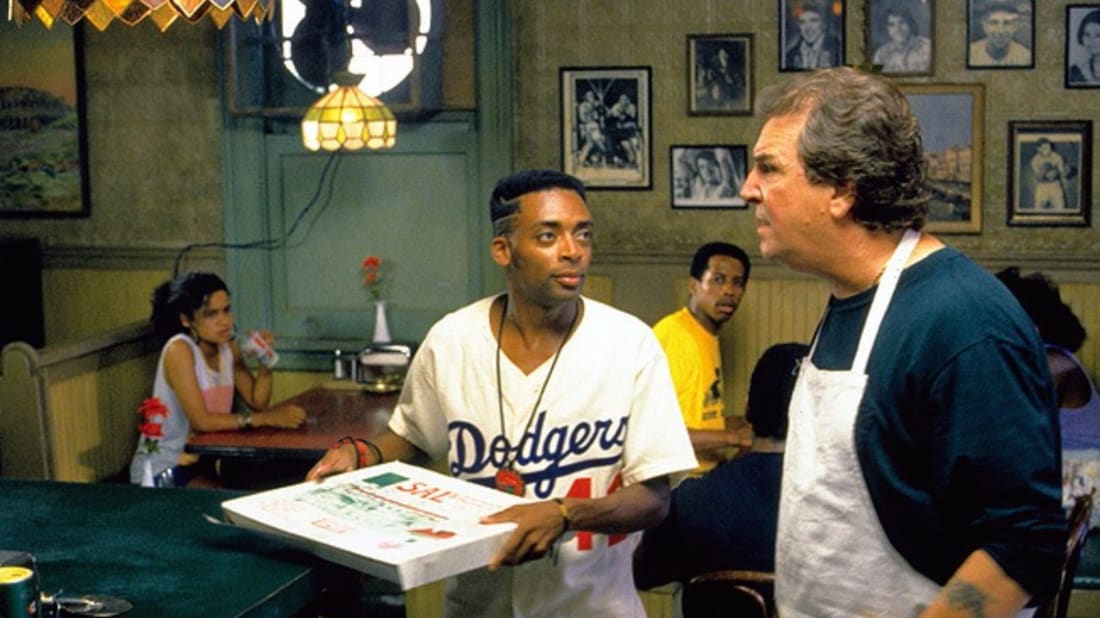
CM: Yeah, ’cause it’s all gesture, right? Putting Muhammad Ali up there costs him nothing. Maybe he even learns something.
SC: His son, Pino, is pretty racist. But Sal on the other hand, he wants to live here and stay in business here. But then just being unwilling to do that little gesture, it shows that he really hasn’t connected with the neighborhood that supports him as much as he should have.
CM: He doesn’t want to put Black people on the wall. He only wants Italian people on the wall, because this is an Italian restaurant. This is my restaurant. I built this with my hands, and I’m Italian, and also the food here is Italian food. So there should be Italian people on the wall. Then the black people in the neighborhood, in Bed-Stuy, they’re like, no, this is our neighborhood. So that’s why we should have people like us on the wall. I understand both points of view. I don’t want somebody coming into my house and telling me what kind of art I can put on my wall. But on the other hand, they’re his customers, and they sustain the place, and they want to see themselves represented. There’s also another layer to the movie. These people are all in this together. They’re all alike on a deeper level that they can’t even see. Buggin’ Out and his band of aggro friends, they can’t see Sal’s point of view, even though it’s not that different from their own. Everybody has blind spots in this movie, that’s what I’m trying to say.
SC: It’s a lot to take in. It’s a lot to think about. The part that’s still so relevant now was really upsetting.
CM: The riot at the end, that sequence is just amazing. It’s so well put together and it just looks great. And yet, it’s also really emotional. Of course, since The Mayor tells Mookie at the beginning, “Do the right thing,” the question of this movie has always been, “Does Mookie do the right thing or not?” And I don’t think the movie knows.
SC: It got me thinking about current events as well, where one side will value property damage over the life of an innocent person. Everything just keeps spiraling.
CM: It’s Shakespearian, in that way. Did it feel stagey to you?
SC: What do you mean by that, exactly?
CM: I love how theatrical it feels, like it’s almost a stage play.
SC: Oh! I can see that for sure. You’ve got this kind of small setting, and you’re hopping around among a bunch of little vignettes. Everyone comes together at the end, but you have these self-contained stories throughout. I could definitely see that making a jump into the theater.
CM: I guess the other big part of this movie is “Fight the Power”, the Public Enemy song in the intro with Rosie Perez dancing. I saw an internet poll a couple of years ago, and this was voted the best opening credits sequence of all time—and it wasn’t even close.
CM: I just love everything about it. “Fight The Power” is my favorite hip hop song of all time, and she was a Soul Train dancer.
SC: Really?
CM: Yeah, this was her first part. She was a regular on Soul Train when she auditioned for this movie.
SC: Wow. I was going to say, I bought new speakers for my TV recently and didn’t realize how high I had them cranked up when I started the movie. And then I was like, Whoa, I’m ready to go now! Ready to go fight the power or join a protest or something! Let’s do this! And I wish I could dance! That was another thing: It really started out with a bang. It started on a high, and then gradually spiraled down as things took a turn.
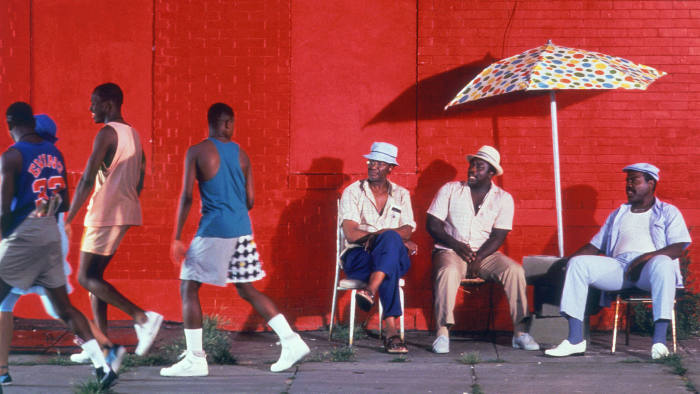
CM: It just looked hot. That’s one thing that this movie does well, because it was filmed mostly outside. But they were blasting the lights the whole time, so it felt hot, you know? And I think that really adds to the tension.
SC: Literal and figurative heating up. I think that just helps push people to a breaking point.
CM: You feel that in Memphis, sometimes, don’t you?
SC: Oh yeah.
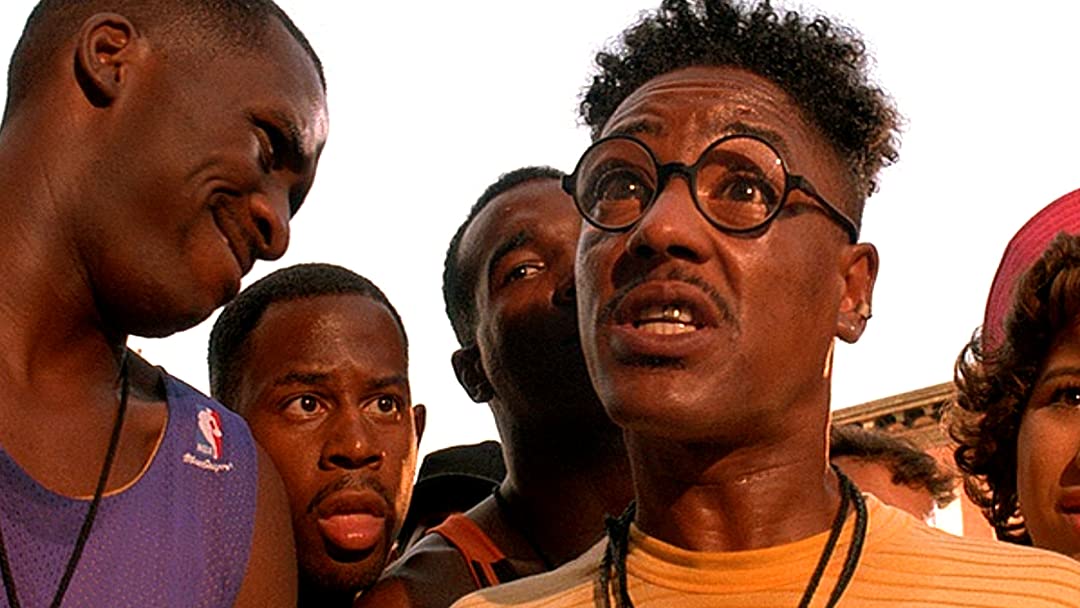
CM: So, would you recommend people watch Do The Right Thing?
SC: Absolutely. First of all, I just thought it was a really good movie across the board. And on top of that, it’s still so relevant. I hate saying that over and over again, because I want that to not be true. But I liked seeing so many names I recognized pop up. There’s Martin Lawrence, and Giancarlo Esposito, I hadn’t realized he was in this. He’s so good.
CM: Buggin’ Out is just a classic character. And then, Samuel L. Jackson is the DJ. Most of these people were at the beginning of their careers. I think Sam Jackson had been around for a while at that point, but he was all bit parts, like, he’s the guy who robs the McDowell’s in Coming To America.
SC: I’m curious, how was this movie received when it first came out? What was the reception like?
CM: A lot of people thought it should have been nominated for Best Picture. It wasn’t. Driving Miss Daisy won that year.
SC: Oh, god.
CM: Yeah. A lot of the debate was what I said earlier: “Does Mookie do the right thing?” The ending was very controversial, because of the riot. In retrospect, I think some people laid expectations on Spike to give us all the answers to racism, but that’s not his purpose here. He’s trying to frame the question. I mean, it’s just like today, you know? Like you said, nothing has changed. If that ending came out in a film today, it would provoke exactly the same conversation as it did in 1989. I swear. It’s depressing just to say it out loud, but it’s true. It’s the truth.
SC: Yeah. What is Mookie supposed to do?
CM: I don’t know.
SC: It’s an impossible situation.
CM: There aren’t any right answers. Part of what is so insightful about this movie is that it’s a bunch of ordinary people faced with these completely unsolvable moral dilemmas. There’s a series of them, and it escalates until you’re sitting on the curb with Mookie while the neighborhood is going up in flames. In that moment, this is not a person who thinks he’s done the right thing.
SC: The look on his face was like, ‘Oh no…’.
CM: But that’s part of the point. Racism backs people into these corners, you know? Like you said, Sal is generous throughout the whole thing. Danny Aiello, by the way is so good in this.
SC: Oh, he’s amazing!
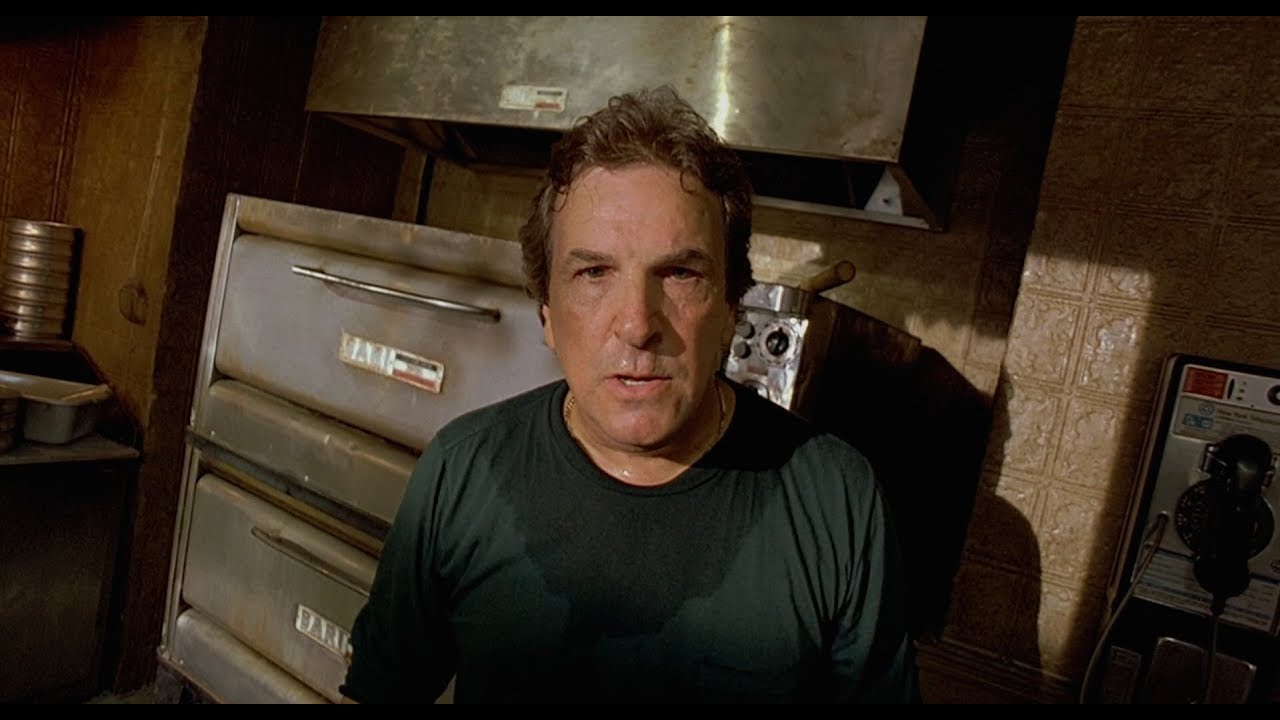
CM: I found that very moving, this time, when he says, “Look at this whole neighborhood. They grew up on my food.” That means something, that’s beautiful to me. But then his kid, John Turturro, he’s awful. Another thing I found really remarkable this time was the conversation between Mookie and Pino, where they actually sit down and kind of try to work it out for a minute. That seems like a very screenwriter thing to do—let’s put these two characters together, bounce them off each other, see what happens, you know? And I don’t mean that in a denigrating way. It’s a time-honored writing tradition, believe me. What was really interesting to me was, they saw their commonality and kind of chose not to pursue it.
SC: Yeah. The crux of the whole flashpoint is, even though there is all this commonality here, they just can’t, in the end, quite get it together. And I guess they want to fight the power, but the power is this, you know, institutional racial and economic disenfranchisement. It’s not really there on screen. There’s not a physical manifestation of it, except for when the police show up, so there’s just not really an outlet for their anger.
CM: I think you’re exactly right. They’re looking for something to fight, but the thing that they need to fight is not there in front of them, so they just start fighting each other.
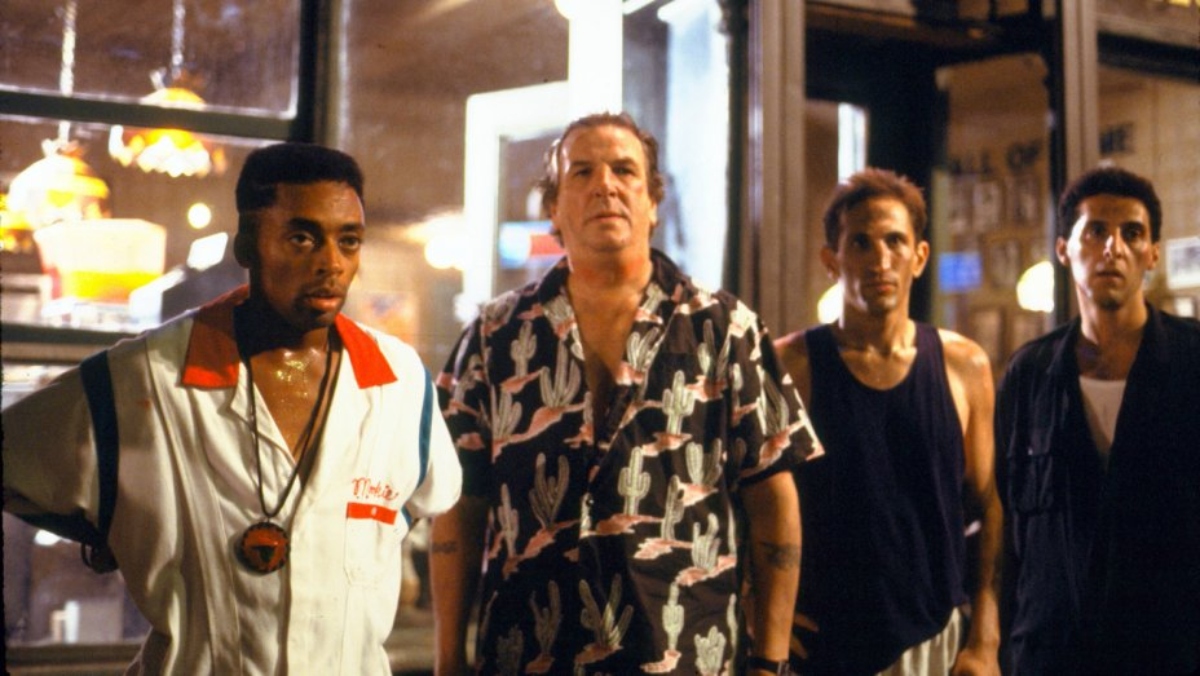
SC: Man, what a movie! what should I watch from Spike Lee next?
CM: Well, you should finish watching Da 5 Bloods. Start again, maybe, with fresh eyes. It should have been nominated for Best Picture, because it literally was the best picture last year. Spike got flat robbed. I think as part of it was the fact that Oscar season was longer this year, and Da 5 Bloods came out back in the summer. People forgot about it. But the man gets no respect. Driving Miss Daisy? Give me a break.
SC: When you say it out loud, it sounds so terrible. I remember thinking about Spike Lee not getting respect, too, in other ways. There was that whole fiasco he got in with the Knicks a while back, at Madison Square Garden, when they kept denying him entry through some door he’d always been using for games. He’s been buying floor seats to that garbage team for years, they should build a statue of him for that. It must be excruciating to support the Knicks.
CM: We can agree on that. Somebody needs to be building statues of Spike Lee.
